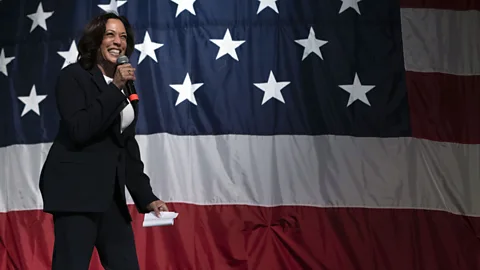Why do we still distrust women leaders?
 Alamy
AlamyDespite strides in women’s representation in powerful roles, a surprising number of people across the world still don’t trust women to lead effectively. These biases are deep-seated – and may be difficult to change.
In November 2020, Maia Sandu reached a milestone by becoming Moldova’s first woman president. Following years of sexist attacks from men and women alike, it was a major victory for Sandu – and women around the world – who are increasingly reaching positions of power. The same month, the American people elected Kamala Harris vice-president; on 20 January, she’ll become the highest-ranking woman in US history.
Yet even though women are vaulting to power, a pernicious culture of distrust in women leaders endures. Recent research suggests this is even true in countries with long experiences of women’s leadership, from Germany to India; in these places, much of the public remains stubbornly resistant to the idea of women in charge. Leaders have had to battle sexist comments, even as they climb ranks or succeed on a global stage – such as New Zealand’s Jacinda Ardern, who was globally lauded for her leadership during the Covid-19 pandemic.
So, while women are receiving votes from the electorate, why are they not also receiving votes of confidence? There’s not one concrete answer – but there are clues in society that can help us piece together the reason.
‘It’s just a myth that one female leader changes society’
The Reykjavík Index assesses attitudes toward female leadership in the G7 countries – Canada, France, Germany, Italy, Japan, the UK and the US – as well as India, Kenya and Nigeria. Its most recent survey of more than 20,000 adults led to some surprising and disheartening results.
 Alamy
AlamyOnly 38% of people in Japan were comfortable with the idea of a female head of government or a female CEO of a major company. In both Nigeria and Kenya, the scores (out of 100) were 62 for government and 56 for politics. The average G7 score for government and politics was higher, holding fairly steady over the last three years at 78. But this is still far from a score of 100 – which would indicate that women and men are seen as equally suitable for leadership positions.
Additionally, only 41% of people in Germany said they felt very comfortable with a woman being the head of government, in spite of Angela Merkel’s long-time chancellorship. “It’s just a myth that one female leader changes society,” says Michelle Harrison, who leads the public division of Kantar, the market research company that runs the Reykjavík Index surveys. And it’s unrealistic to expect a single leader (woman or otherwise) to create sweeping change around gender roles.
Another striking finding was that around the world, young men were especially unlikely to endorse women leaders. This is surprising given that younger generations are often considered more progressive than older ones.
But in general, it’s common for beliefs about leadership to default to stereotypes about masculine behaviour, leading to unconscious gender bias. This can be present even in people who consider themselves progressive, including younger people.
The work of Yoshikuni Ono, a political scientist at Waseda University in Tokyo, offers another clue to this generational puzzle. In the US, Americans tend to overestimate women’s representation in Congress – in one study, by 14% on average. But younger people are especially inaccurate, and the gap in correct knowledge is increasing between older and younger people.
It may be, Ono explains, that “especially young, male voters think that women are already represented in politics because at schools, at universities, they see more women. These days, there are many more female students in college than men.” Generally, if you think that gender balance already exists, you’re less likely to think it’s important to elect women leaders. So, erroneous beliefs may lead to bias against women’s leadership.
 Alamy
AlamyOverall, the situation may be even more stark than these findings suggest. The Reykjavík Index researchers asked respondents, “For each of the following sectors or industries, do you think men or women are better suited to leadership positions?” But political scientists have found that when asked direct, explicit questions about prejudice against women leaders, many survey respondents deny their prejudice. This is largely due to social-desirability bias; essentially, it’s hard to admit to a belief that’s seen as socially unacceptable. Social-desirability bias bedevils survey researchers and pollsters in a number of fields where people feel uncomfortable being completely honest, leading to potentially inaccurate results.
In the US, Hillary Clinton’s first presidential campaign in 2008 led to some interesting political-science findings about explicit versus hidden hostility toward women presidential candidates. In one study, more than a quarter of survey respondents admitted to being angry or upset at the thought of a female president, when this question was nestled among other ones. This was considerably higher than what the traditional polls suggested at the time. Similarly, 2019 research showed that women became more than twice as likely to express misgivings about female leaders – and differences between Republicans and Democrats almost vanished – when questions were more masked.
Deep-seated biases
There’s a common belief among men and women alike that women are too delicate to lead. This matters because, according to a Wilson Center report on women’s public leadership in the Middle East and North Africa, “Public perceptions regarding women’s ability to lead is a key driver of how much power they will have while in office.”
Some people who don’t consider themselves sexist believe that because the world is sexist, women leaders are likely to be weaker. Sean Nguyen, a 33-year-old living in Los Angeles who runs a website that compares internet service providers, believes that “male leaders tend to have more authority. It’s wrong and I’d like to see that change, but … we have to work within the system we exist in.” Nguyen also admits that this preference extends to politics and business. “If I were completely honest, I would prefer a man to lead my company over a woman.”
These kinds of beliefs aren’t surprising, according to Alice Eagly, a psychologist at Northwestern University in Evanston, Illinois. “The stereotype is that women aren’t agentic” – or decisive and authoritative – “and their voices aren’t as loud and they’re kind of small.” Because those are the types of traits traditionally associated with men and with leaders, notions of leadership have become bound up with perceptions of masculinity.
In working within and against these gender norms, women leaders may find themselves in a double bind. Political scientist Ono explains, “Female candidates face a more difficult time figuring out what would be the good strategy to win the election or get more support from people, because deviating from gender stereotypes might be bad for women. At the same time, conforming to gender stereotypes punishes them as well. So, it seems very difficult for female politicians to find the sweet spot when they plan their strategy.”
This double bind also applies to other groups that may be criticised whether they adhere to or push against biases. In multiracial societies, women of colour are often particularly penalised. For example, black women are stereotyped as too abrasive and Asian women are stereotyped as too docile to lead. Among women and minorities, “tokens” are highly visible within organisations and especially within positions of power, which creates an additional dilemma: excel, and become even more conspicuous and scrutinised; or moderate their achievements, to fit into dominant groups’ expectations.
 Alamy
AlamyThe Covid-19 effect
Unfortunately, the pandemic has not been a turning point for bias against women in power. In the pandemic-linked recession, women are being disproportionately affected by job cuts and reduced working hours. Women are also under-represented in scientific and policy committees related to Covid-19 response.
Women heads of government have won plaudits for decisive leadership during the pandemic, including New Zealand’s Ardern and Taiwan’s Tsai Ing-wen. And in the US, states with women governors initially had fewer deaths from Covid-19 than states with male governors.
But it’s hard to judge patterns when these women leaders are still such a small sample (currently only 9 out of 50 US governors are women). More generally, the strong performance of women leaders doesn’t appear to have improved public beliefs about women’s leadership. This pattern already exists in other domains. While women’s leadership in the banking and finance sector is associated with more stability and higher financial returns, this sector remains imbalanced in terms of gender.
Referring to the three years of Kantar’s survey research on attitudes toward women’s leadership, Harrison comments, “The consistency of the data is a standout feature, that you can have Covid and that you can have Me Too, and you don’t see big shifts at all.”
Over time, some beliefs have shifted – up to a point. According to Eagly’s and colleagues’ analysis of seven decades of opinion polls on gender stereotypes, from 1946 to 2018, the US public considers women more competent than it did before. But beliefs about women’s agency (the ability to achieve goals and reach mastery) haven’t budged. As more women have entered the workforce, “female ghettos” have emerged within traditionally male fields, such as education ministries within government or human relations within management. To reach the top of the top, more cultural change is needed.
‘We have to see it’
“One of the solutions to gender equality is to change not the image of women or men, but to change the image of the leadership roles,” says Eagly. She points to Ardern’s focus on New Zealanders’ welfare during the pandemic, and Merkel’s calm authority. These aren’t shouting strongmen hyper-focused on the economy and resistant to cooperation, which represents one stereotyped view of power.
Akshi Chawla, an independent researcher in Delhi who created the #WomenLead newsletter, believes that the media and creators of popular culture have a key role. If coverage and conversations about women’s leadership are to have sustained impacts, “we need to do it consistently in a routine, regular and critical manner,” she says. The universality of Covid-19 has put gendered leadership under a microscope; and the election of Kamala Harris has been a big news story in India, where Harris’ mother was born. Chawla advocates for building on this momentum to avoid complacency around gender equality, or the perception that one extraordinary event is sufficient. “One woman serving for long terms may not be enough. It still reinforces the stereotype that women in office are the exception and not the norm.”
 Alamy
AlamyAt the policy level, gender quotas and childcare support are among the tools that clearly improve women’s participation in leadership roles. Individual workplaces can nurture women leaders by, for instance, supporting networks of role models and enabling flexible work.
Changing hearts and minds will be harder, but it’s essential. At an individual level, gaining certain life experiences may help to counter gender bias. Ono comments that in Japan, older men may witness frequent discrimination against women colleagues and partners, making them more sensitive to the need for women leaders. In the US, men whose first children are daughters are more likely to support female political candidates. “That’s what happened to me as well,” says Ono. “I started to get more interested in gender issues once I had a daughter. She’s six years old, and now I’m concerned about her future.”
And for young girls, this is a critical time to be learning about what kinds of people get to be in charge. “The parents have to think about the model that they are personally providing, because that’s going to be one of the child’s most important models ever,” says Eagly. If mothers and fathers stick to traditional divisions of labour within the home, and if girls are directed into nurturing roles while boys are nudged into decision-making positions, then it’s unsurprising that beliefs about women’s leadership potential will remain frozen.
Eagly emphasises that from what’s happening at home to what’s happening on TV, the visibility of women leaders will shape such views. “We can’t just imagine it, we have to see it.”
